NCUIH Requests Committee Action to Extend Medicaid Provisions Expiring in 2023
On September 20, 2022, The National Council of Urban Indian Health (NCUIH) sent a letter to Chair Frank Pallone and Ranking Member Cathy McMorris Rodgers on the House Committee on Energy and Commerce requesting a markup on the Improving Access to Indian Health Services Act (H.R. 1888). This bill would establish permanent 100% Federal Medical Assistance Percentage (FMAP) for services provided to American Indian/Alaska Native (AI/AN) Medicaid beneficiaries at urban Indian Organizations (UIOs). The American Rescue Plan (ARP) authorized 8 fiscal quarters of 100% FMAP to UIOs. However, the ARP provision expires in less than 5 months, and UIOs are not seeing the benefit of this provision. States are generally not increasing their Medicaid reimbursement rates to UIOs, resulting in states seeing the 100% FMAP savings intended to go to UIOs.
Full Letter Text
Dear Chair Pallone and Ranking Member McMorris Rodgers,
On behalf of the National Council of Urban Indian Health (NCUIH), the national advocate for health care for the over 70% of American Indians and Alaska Natives (AI/ANs) living off-reservation and the 41 Urban Indian Organizations (UIOs) that serve these populations, we write to request the markup of H.R. 1888. This bill would permanently establish a 100% federal matching rate, also known as the Federal Medical Assistance Percentage (FMAP), for Medicaid services provided at UIOs. This bill would also permanently expand Medicaid coverage to include clinical services provided outside of a clinic by an Indian Health Service (IHS) facility, a tribe or tribal organization, or UIO.
Extending FMAP to UIOs
FMAP refers to the percentage of Medicaid costs covered by the federal government, which will be reimbursed to the states. In 1976, Congress passed the Indian Health Care Improvement Act (IHCIA) which amended the Social Security Act to add Section 1911. Section 1911 authorized reimbursement by Medicaid for services provided to AI/AN Medicaid beneficiaries at Indian Health Service (IHS) and Tribal health care facilities.1 In addition, ICHIA amended section 1905(b) of the SSA to set the FMAP at 100% for Medicaid services received through an IHS facility, whether operated by IHS or by an Indian Tribe. When Congress first authorized 100% FMAP for the Indian healthcare system in 1976, it did so because it recognized that “Medicaid payments are . . . a much needed supplement to a health care program which has for too long been insufficient to provide quality health care to” AI/ANs and because “the Federal government has treaty obligations to provide services to Indians, it has not been a State responsibility.”2 Unfortunately, the IHCIA amendments to the SSA were not inclusive of UIOs, meaning that services provided at UIOs were not eligible for 100% FMAP under IHCIA’s authority.
In March of 2021, Congress enacted the American Rescue Plan Act of 2021 (ARPA). Section 9815 of ARPA authorized eight (8) fiscal quarters of 100% FMAP coverage for Medicaid services at provided UIOs. Congress intended Section 9815 in part to increase the financial resources available to UIOs and support the provision of critically needed health services to urban AI/ANs during the COVID-19 pandemic. However, the ARPA’s 100% FMAP extension to UIOs ends in less than 6 months, and UIOs have generally not seen any increased financial support because of this extension. Unfortunately, states are not increasing their Medicaid reimbursement rates to UIOs, citing the short-term authorization for the UIO 100% FMAP extension as a reason not to increase their reimbursement rates.
On March 23, 2021, the House Committee on Energy and Commerce held a legislative hearing on the Affordable Care Act, which included H.R. 1888. At the hearing, Representative Raul Ruiz emphasized that there is no sound policy reason for excluding UIOs from eligibility for 100% FMAP and advocated for the Committee to pass this critical piece of legislation to address this longstanding issue. There has been strong support for the expansion of 100% FMAP to UIOs across Indian Country. For example, both the National Congress of American Indians and the National Indian Health Board have passed resolutions in support of extending 100% FMAP to UIOS. Additionally, there has been longstanding bipartisan congressional support for extending 100% FMAP to UIOs, with over 17 pieces of legislation having been introduced since 1999 on this issue.
The federal government has a trust responsibility to provide “[f]ederal health services to maintain and improve the health of the Indians.3 The federal government owes that duty to all AI/ANs, no matter where they live, and Congress has declared it the policy of the United States “to ensure the highest possible health status for Indians and urban Indians and to provide all resources necessary to effect that policy.”4 Permanent 100% FMAP for UIOs will further the U.S. government’s trust responsibility to AI/ANs by increasing the available financial resources to UIOs and supporting them in addressing the critical health needs of their AI/AN patients. We request the markup of H.R. 1888 to honor this trust responsibility and progress the health of all AI/AN people, regardless of their location. Thank you for your attention to this urgent matter.
FMAP Background
FMAP refers to the percentage of Medicaid costs covered by the federal government, which will be reimbursed to the states. In 1976, Congress passed the Indian Health Care Improvement Act (IHCIA) which authorized reimbursement by Medicaid for services provided to AI/AN Medicaid beneficiaries at IHS and Tribal health care facilities. This set FMAP at 100% for Medicaid services received through an Indian Health Service (IHS) facility, whether operated by IHS or by an Indian Tribe.
Congress first authorized 100% FMAP for the Indian healthcare system in 1976 because it recognized that “Medicaid payments are . . . a much needed supplement to a health care program which has for too long been insufficient to provide quality health care to AI/ANs.” However, UIOs were not included in this IHCIA authorization as an oversight, meaning that services provided at UIOs were not eligible for 100% FMAP.
ARPA FMAP Provision and Permanent 100% FMAP for UIOs
In March of 2021, Congress enacted the ARP, which authorized two years of 100% FMAP coverage for Medicaid services provided at UIOs. Congress did this in part to increase the financial resources available to UIOs and support the provision of critically needed health services to urban AI/ANs during the COVID-19 pandemic. However, ARPA’s 100% FMAP extension to UIOs expires in less than 6 months, and states are generally not increasing their Medicaid reimbursement rates to UIOs, citing short-term authorization as a reason not to increase their reimbursement rates. H.R. 1888 would remedy this problem and establish a permanent 100% FMAP rate for services provided at UIOs to ensure they can continue providing critical health services to their AI/AN patients.
This bill would also permanently expand Medicaid coverage to include clinical services provided outside of a clinic by an IHS facility, Tribe, tribal organization, or UIO. This has been a critical priority identified by Indian Country to ensure that services provided through an Indian health care program are eligible for reimbursement at the IHS all-inclusive rate, no matter where that service is provided.
Support for 100% FMAP to UIOs
On March 23, 2021, the House Committee on Energy and Commerce held a legislative hearing on the Affordable Care Act, which included H.R. 1888. At the hearing, Representative Raul Ruiz emphasized that there is no sound policy reason for excluding UIOs from eligibility for 100% FMAP and advocated for the Committee to pass this critical piece of legislation to address this longstanding issue. Additionally, there has been longstanding bipartisan congressional support for extending 100% FMAP to UIOs, with over 17 pieces of legislation having been introduced since 1999 on this issue.
There has also been strong support for the expansion of 100% FMAP to UIOs across Indian Country. For example, both the National Congress of American Indians and the National Indian Health Board passed resolutions along with NCUIH in support of extending 100% FMAP to UIOs.
The federal government has a trust responsibility to provide health services to maintain and improve the health of all AI/ANs, no matter where they live. Congress has also declared it the policy of the United States to ensure the highest possible health status for AI/ANs and to provide all resources necessary to do so. H.R. 1888 is a critical piece of legislation that would further the federal government’s trust responsibility to AI/ANs by increasing the available financial resources to UIOs to better address the critical health needs of their patients and ultimately bolster the entire Indian Health system.
Next Steps
NCUIH will continue to advocate for the markup of H.R. 1888 and provide updates on its movement within Congress.

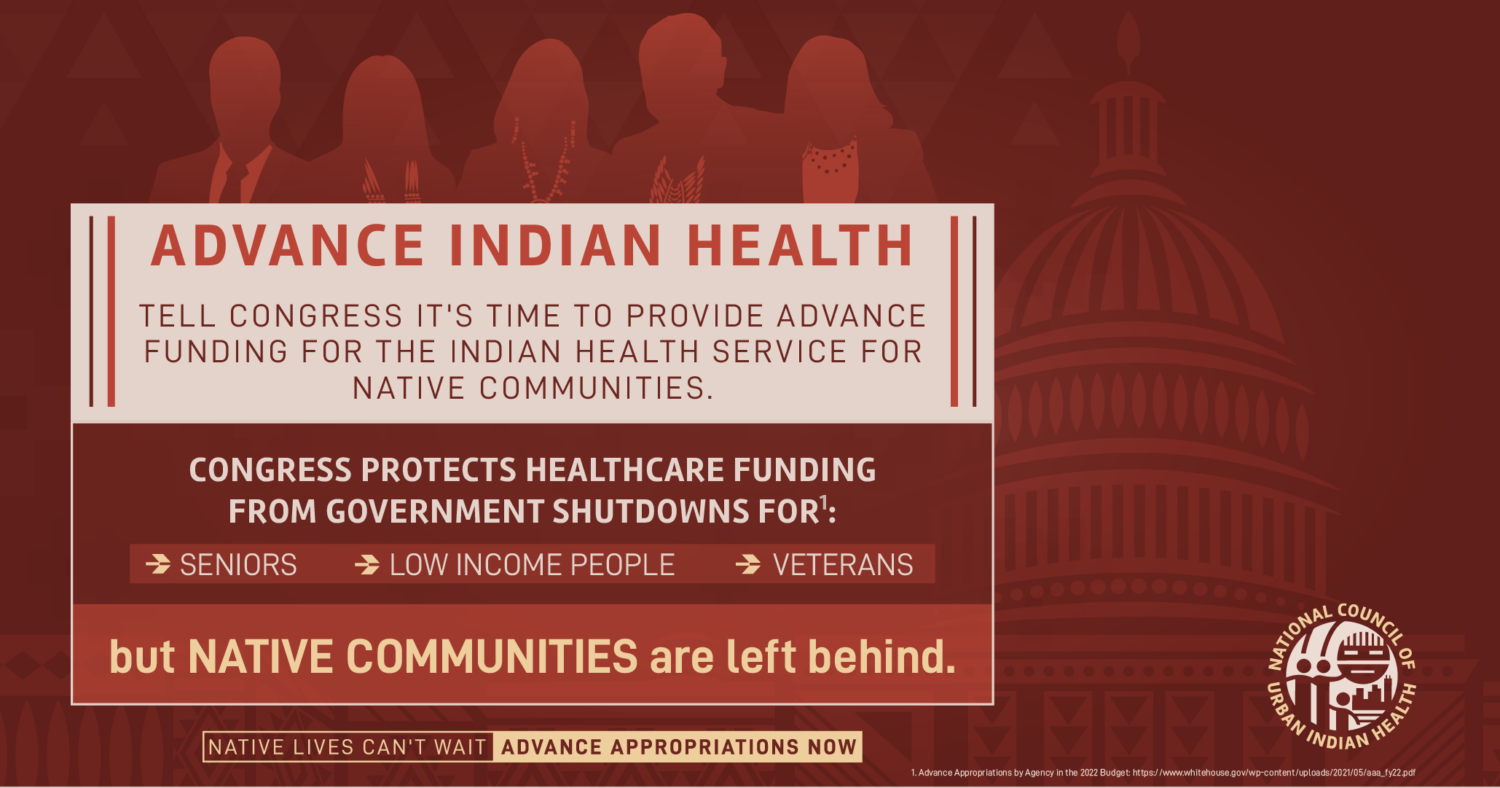
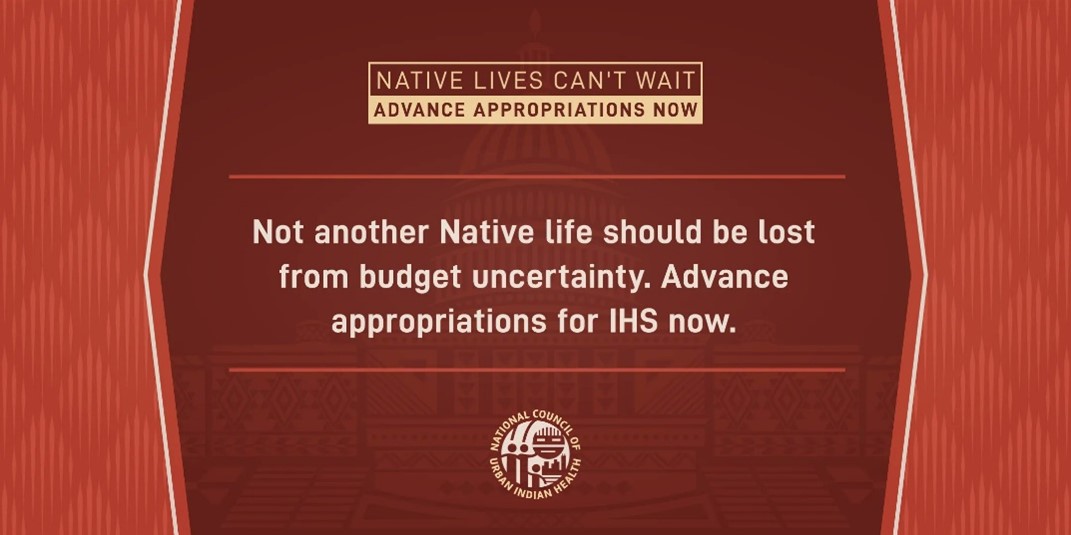
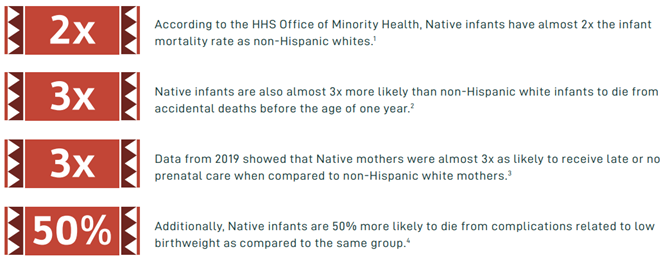
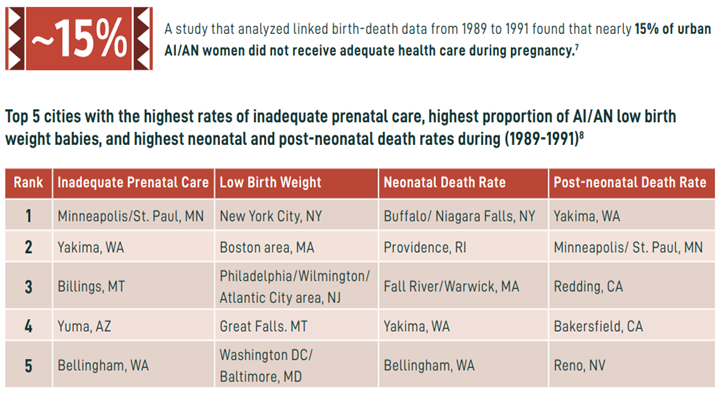
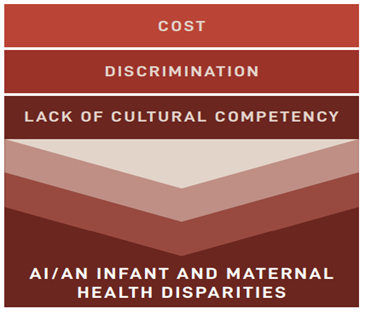
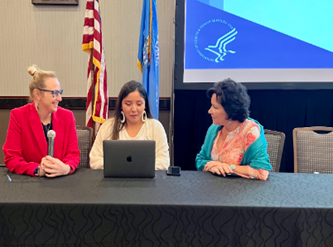 Raimondi highlighted that “over half of urban Indian health centers provide care for maternal health, infant health, prenatal, and/or family planning. However, due to chronic underfunding, many of these health centers only have the capacity to carry out these services for the early stages of pregnancy.” She continued to say, “despite desiring to do so, many urban Indian health clinics cannot expand their services to provide complete care for mothers and infants from conception to birth due to underfunding.” Raimondi provided the following recommendations to the Advisory Committee:
Raimondi highlighted that “over half of urban Indian health centers provide care for maternal health, infant health, prenatal, and/or family planning. However, due to chronic underfunding, many of these health centers only have the capacity to carry out these services for the early stages of pregnancy.” She continued to say, “despite desiring to do so, many urban Indian health clinics cannot expand their services to provide complete care for mothers and infants from conception to birth due to underfunding.” Raimondi provided the following recommendations to the Advisory Committee: